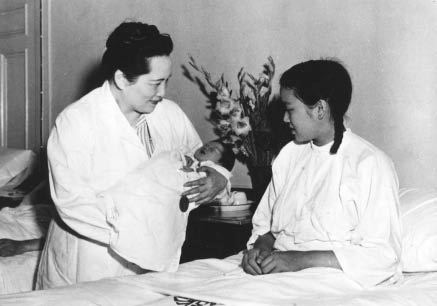The Enduring Legacy of China’s First “First Lady”

Soong with a young mother and her newborn baby during a hospital visit in 1955.
By AI BAIYING
JANUARY 27 will mark the 120th birthday of Soong Ching Ling, one of China’s greatest philanthropists. As the wife of the father of the modern Chinese nation, Soong was also known as Madame Sun Yat-sen. She made many significant contributions to China’s social and welfare causes in her lifetime. Though she passed away in 1981, her legacy lives on in a number of grass-roots charitable organizations that continue to help the underprivileged.
Soong at one stage headed the People Relief Administration of China (PRAC), the Red Cross Association of China and the China Welfare Institute. In her commitment to public service, she was very much the “first lady” of early modern China. Zhou Enlai, the first premier of the People’s Republic of China, once described China’s welfare cause as “Madame Sun’s cause.”
Soong remains a symbol of courage in China and has inspired people from all walks of life to take up charitable causes. On her 120th birthday, we are happy to say that the first “first lady’s” lifelong work continues to make a difference to people’s lives.
An Example for All to Follow
Soong Ching Ling was born to a business and missionary family in Shanghai on January 27, 1893. She studied at Wesleyan College for Women in the U.S. State of Georgia before meeting Sun Yat-sen, the leader of China’s 1911 Revolution and founder of Kuomintang (KMT or Nationalist Party). The two were married on October 25, 1915.
Sun Yat-sen passed away in 1925. As a widow, Soong’s importance in China’s social and political landscape grew even stronger.
Japan launched an all-out war on China and full-scale invasion in 1937. In June the following year, Soong Ching Ling established the China Defense League in Hong Kong, which drummed up support for China’s fight against Japan and provided help to children in war-affected areas. When the war ended the China Defense League was renamed the China Welfare Fund (CWF). A child welfare center and a children’s theater of the arts were set up to provide children with cultural activities and educational and health services.
In August 1950 the CWF was renamed the China Welfare Institute (CWI). Since then it has emphasized studying social causes and implementing new initiatives in maternal and child hygiene, healthcare services and children’s education. It set up the International Peace Maternity and Child Health Hospital and has opened nurseries, kindergartens, a children’s palace and children’s theater. It founded the magazines Children’s Epoch and China Reconstructs (later renamed China Today). The CWI has also maintained a variety of exchanges and cooperative relationships with foundations and organizations around the world.
After China began its reform and opening-up in the late 1970s, the CWI set up a television production center for children’s education, the Soong Ching Ling kindergarten, a research and information center, the Shanghai Soong Ching Ling Foundation, the Camphor Tree Award (given to individuals who make outstanding contributions to improving maternity care and children’s education and health) and the Soong Ching Ling Scholarships.
In recent years the CWI has expanded the scope of its activities. It established an experimental school to explore a new approach to the nine-year compulsory education model and promote all-round education. It has also set up an experimental nursing home in Shanghai that offers a broad range of in-house activities for seniors to live healthy lifestyles.
Soon after the establishment of the CWI Soong Ching Ling stated that its purpose was not to replace government, but rather set an example for the government to follow. The CWI exists in harmony with government facilities and complements national policy. It is a role model that has, among other things, pioneered the country’s approach to education and imported teachers from the West. Some of its initiatives have been experimental, such as appointing a doctorate degree holder in child psychology from the United States as principal of its kindergarten. In taking a micro approach to the challenges facing Chinese society, the CWI has made a difference on the macro scale.
In the early 1980s, many leaders of foreign governments and political parties came to China to visit. Among the places they saw were CWI Children’s Palace, the site of the Chinese Communist Party’s first national congress and the City of God Temple in Shanghai’s old concession neighborhood. Leaders expressed their support for the philanthropic activities of the CWI.

